Heavy spoilers ahead…
What happens when a film-maker who revels in the art of startling his audience, decides to raise his game by not feeling the need to have everything spelt-out, or in a way, settled? The starkly polarized responses to Karthik Subbaraj’s Iraivi seem to suggest that all hell would surely break loose. Never before in the recent past had a work of art so emphatically split the viewer’s perspective of it into the farthest extremes, with almost a non-existent middle ground between the two! This urge to jump to knee-jerk conclusions probably stems as the outcome of our industry’s relentless training in making its audience view films at momentary face value. We are so obsessed with one-word-verdicts that a film like Iraivi, which drags us into its world and asks us to make sense of it by projecting ourselves on-screen, almost catches us off-guard. And so, with such films, it becomes imperative to take apart the totality of the film ‘experience’ and interpret the kind that was actually intended and assembled. And that, exactly, is the purpose of this piece.
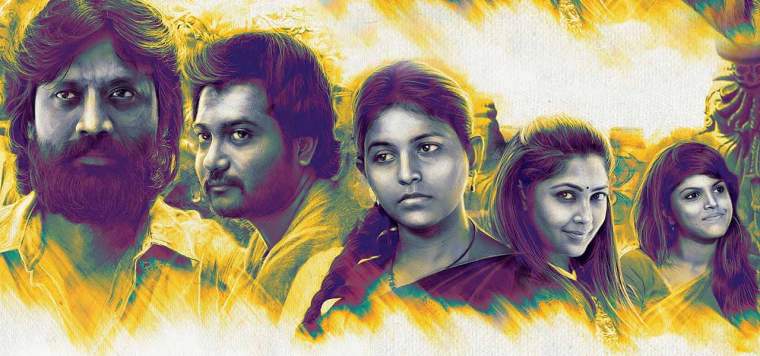
Karthik opens the film with a black screen and what seems like the sound of a light shower. Over the course of the opening credits, the splashing slowly intensifies to the point of becoming unmistakable. We know that the action, when it begins, would be set against the backdrop of the rains. But what comes as a sweet surprise, and probably sets the tone of the film, is the way this backdrop runs as a common thread through quite a few unconnected spatial events, seamlessly stitching them together. This is where we realize that the rain might become a recurring leitmotif through the course of the narrative. Three very different women are introduced in a series of brilliant intercuts, each of them reacting to their situation in a distinctive way.
Ponni (played by Anjali), a small-town girl who had learnt to adapt to her milieu and find happiness within her confined walls, is discussing the future with her classmates. She understands well that the concept of ‘love’ is beyond the limits of the society she lives in. But however, she has her version of ‘love life’ all planned out. An arranged marriage which doesn’t come across as a compromise, a loving husband who romances like crazy, three kids, and an owned house is her idea of a lifetime of happiness. Doesn’t she have any aspirations outside of a utopian family life? Clearly not… but who is to judge her? We all harbour desires and she happens to be representative of a particular ‘invisible’ female kind. The kind which wants to get on the ground to ‘relish’ the rains, but eventually stays inside fearing the consequences. A cycle topples over in long shot, setting up a chain reaction in the pack parked in the playground. It might not be Ponni’s. Hers might not the last one falling either. Her cycle is sandwiched somewhere in the middle. It had been toppled. It might topple a few more.
Somewhere else, in the same temporal frame, Yazhini (portrayed by Kamalini Mukherji) is feeling accomplished. She is all set to marry a filmmaker – the love of her life – after quite a struggle. She is visibly thrilled, but as far as first impressions go, she doesn’t seem to be in Ponni’s league. She appears far more independent and self-focussed. She doesn’t seem like the one who will take the easy way out. Challenges seem to excite her. She has a career of choice. She speaks fluent English. And for her, marriage and kids don’t seem to be the end of the road. In her own words, she hates to be locked up within a template existence. She looks upon her life-partner as someone who would support her ambitions and help her grow.. Don’t we see a Yazhini almost every day in our lives? A friend. A colleague. A classmate. A relative. Isn’t she ubiquitous? At the brink of entering a new phase of life, she is sure that her future holds quite a lot in store. She nurtures tall dreams, and she is confident she can ace them all. For now, she puts her hand out through the window and enjoys the splashing drops. Does she harbour a desire to get all wet like Ponni? May be or maybe not, but at present, she is content in watching it from a distance.
Meanwhile, in another household, an elderly woman (lived by Vadivukkarasi) is on the verge of breaking down. She had been again treated badly by her husband in front of her relatives. It was not her fault. It had never been. For the past 45 years. And it had almost become the norm now. Her marriage at the age of sixteen was not by choice. Neither did she have a say in deciding the man she was going to live with for the next few decades. All that she prayed for were a little understanding and minimal self-respect. She got neither. She had always wanted to be treated like a life partner – the friend, the companion, the confidante. But over years, she had seen herself being reduced to the soft-touch mother and the submissive wife, more like that of the family’s punch bag. She had to silently bear the brunt of their outbursts in the interests of her family, but the price she had to pay for that was downright cruel. Hasn’t she lost herself in the process? Someone asks her to stop complaining and come out before she gets chided for being late. With a heavy sigh, she wipes her tears and puts her hand out of the window to feel the rain. What is she feeling? Probably, nothing. Her desires have been systematically killed over time. For her, and the kind she represents, the rain merely means a couple of things; saving the clothes in the terrace from getting wet, and reminding her family members to take the umbrella while going out.
The screen fades out. From here on, Karthik explores the journey of these women by focussing on the men, they had willingly or unwillingly let into their lives. The beauty of this exploration is that he just lets his characters be, without meddling too much with their inherent personality traits. They laugh, they dream, they cry, they disappoint, they hurt, they react, they lie, they blunder… and through these contrasting sensibilities, they bring to screen some of the most fascinating yet grounded character-studies in recent times.
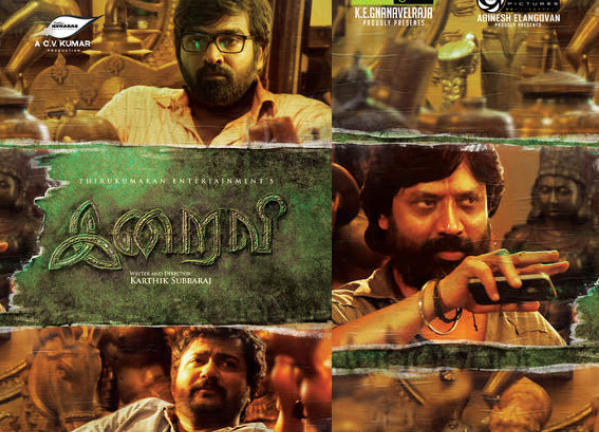
We are first introduced to Arul (played brilliantly by SJ Surya), the promising film-maker who had married Yazhini with truckloads of celluloid dreams, seven years before. He seems to have everything in life – a loving wife, a peach of a daughter, supportive brother, understanding parents, and loyal friends – but he is not happy. When an altercation with the egoistic producer casts a shadow over the release of his dream film, the man is crushed beyond words. How would it feel to have years of passion and hard work washed down the drain one fine day? To see your film – the baby you had so painstakingly given life to – lying useless in the lab? After the initial shock, the realization that his creation might never see the light of the day grounds Arul from his imaginative self to modes of escape from the mounting pressure to prove himself to the world. With rumours and ridicule escalating by the day, he starts to take solace in alcohol. This is something, many of us would find it difficult to relate with. Being labelled a loser is one thing. Getting a handle on the emotional repercussions that such a fact incites among your near and dear is entirely a different ball-game. Over time, you tend to look for distractions from the whole bloody mess. And for a creator who has been denied his applause, it’s all the more compelling.
Yazhini understands her husband’s frustration, but his growing fixation with alcohol disturbs her. Balancing her career with her responsibilities at home, she tries to keep herself busy. A sick mother-in-law in the hospital (Vadivukkarasi) to tend to doesn’t make things any better. On one hand, she wants to be supportive, standing by Arul as they tide over the tough times together. On the other hand, she is exasperated by her husband’s stubbornness in not moving on to fight the next battle and refusing to empathize with her struggles in keeping the ‘home’ afloat. Caught between the two, she holds on to the hope that the film’s release would return Arul back to his confident self. Consider the sequence where she confronts Arul who is stealing a quick drink in the bathroom. A poignant folk song is heard in the background. If you missed the train I’m on… You will know that I am gone… Indeed! The painful lament of the ignored and ashamed artist is striking. The man would never be the same again. When she tries to make him see sense, he argues that if it was possible to disown something that dear so easily, he would have done it long back. Among the film posters in the backdrop, that of Guru Dutt’s Pyaasa looms large. What better way to showcase the turmoil of a struggling artist yearning for recognition!
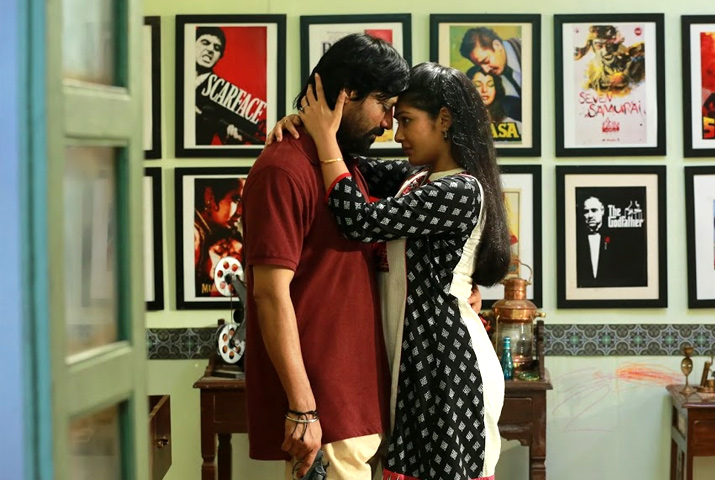
Karthik meanwhile introduces four new characters – Arul’s dad (played with a signature restraint by Radharavi), Michael (Vijay Sethupathi in terrific form) the son of Radharavi’s long-time assistant who continues to help out in the family’s sculpture studio, Michael’s friend Malar (portrayed by Pooja Dewariya) and Jagan (played by Bobby Simha) the younger brother of Arul – everyone of them affecting each other in some way.
Arul’s dad, who realises his mistake when his wife goes into coma, after having turned a blind eye to her sentiments by treating her like a housemaid for almost five decades, is almost representative of a generation soaked in patriarchy. What took him so many years to understand his much-conspicuous apathy? Was it his wife’s sudden physical absence? Had he taken her so much for granted that he had almost forgotten to acknowledge her existence when she needed it the most? Even now, he doesn’t voice his regrets. The cry for absolution is there, hanging on his face, day in and day out. The realization almost reduces him into a silent shadow of his own self. What at all could atone for a life-time of chauvinistic mistreatment? If only special ward care in multispecialty hospitals and countless nights of silence at her feet would.
Michael, having grown up with Arul and Jagan, had always considered himself a part of the household. He is there, ever ready to help, when either of them needs him. Michael gets attracted to his friend Malar and begins a relationship with her. What starts off as a casual acquaintance turns physical over time. When we first see the couple in bed, we hear Vairamuthu’s “Unnaithaane thanjam endru Nambi vandhen naane” in the background. We smile at the aural hint. Michael expectedly falls head over heels in love with Malar. But the girl is in no mood to reciprocate. Having lost her husband, whom she had loved and married, Malar seems to be clear-headed in her choices. “Sex is a physical need, and that’s why we are in bed together. Why does a physical relationship necessarily entail commitment?” she asks. This is a powerful statement about sex, and it’s tossed off in the most matter-of-fact way. What is that which makes Malar take decisions with such confidence and authority? Is it her education and financial independence? Is it her upbringing? Or is just her inherent character trait? Whatever it is, the fact that something this candid, this controversial is voiced out through one of the female leads happens to be Karthik’s finest punch of all.
And so we get the scene where Michael is forced into an arranged marriage with Ponni. That night, when he tells Ponni that he could never be the affectionate husband that she dreams of, we know that he hasn’t moved on from Malar. Why then did he agree for the marriage, at least in a passive way? Why did he overlook the emotions of the girl involved? Couldn’t he have convinced his folks to give him the time needed to come out of his complicated feelings? Before we could make sense of the contradictions, we are exposed to some age-old hypocrisy, when the next morning, the entire elderly female neighbourhood starts advising Ponni on her responsibility in bringing her husband into line. Why the counselling to the wife, when the conflict is with the husband? If only we had answers!
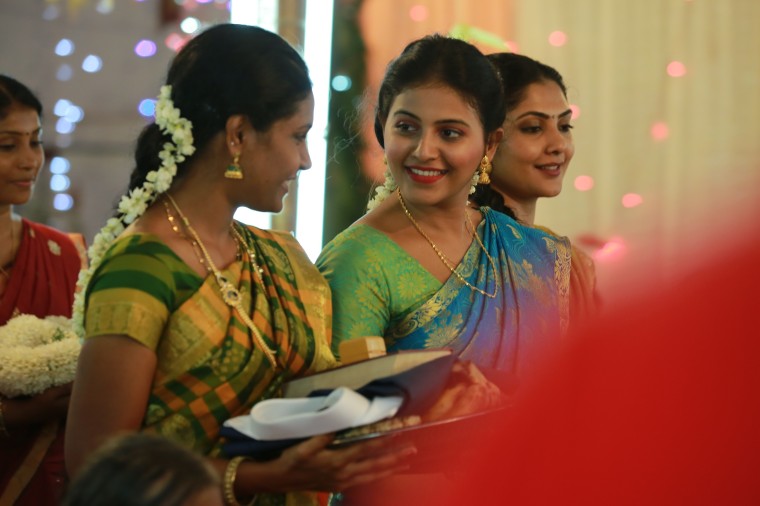
The action shifts back to Arul, who now finds his alcoholism spiraling out of control. Yazhini tries to intervene almost every day, with little success. She sees her life crumbling before her own eyes like a stack of cards, but she keeps convincing herself that it’s all just a passing phase. And so, when Arul lands up in the police station after getting involved in a drunken brawl with her colleague, she decides on a whim that she has had enough. Arul is shocked out of his wits, but he is also not in any position to defend himself. And here, Karthik smartly captures the oscillating mind of Yazhini in walking permanently out of Arul’s life. Consider the sequence when the divorce talks are initiated between the two families. A lot of arguments happen and all of a sudden, the kid sleeping in the room winces. Both Arul and Yazhini, having instinctively gotten up from their chairs, stare at each other for a moment. Cut to the next morning, when Yazhini and her father-in-law find themselves in the producer’s office, attempting some sort of a resolution. Was it the child that held the couple together? Or was it Yazhini’s inability to imagine a life without Arul? Probably, it was the sum total of the two.
Karthik goes on to explore the situation that makes Michael get over his craze for Malar in an interesting way. Consider the scene where he goes to her place attempting an explanation. Malar dismisses him hurriedly, with a parting advice to be a good husband… but not before faking some sort of a closure. Michael now returns to Ponni keen on making amends for his erstwhile indifference. Why did he need that ploy to realize his cold-heartedness towards his wife? Was it his idea of getting back at Malar? Or was all the anger and disappointment being projected as new found affection? Nevertheless, Ponni is truly elated. It’s the first time Michael was making her smile. She breaks the news to him that she is carrying. The look on her face says it all. But not for long… as Michael is immediately called upon to keep an eye on Arul, who had supposedly gone mad over a nasty altercation with the producer. When Michael and Jagan reach the producer’s place, they find Arul on the verge of getting killed.
We are led into this incredible scene, cleverly transposed into Michael’s head and made to buy his fatal impulse. As Michael pounds the producer to death in a fit of rage, it’s almost impossible to comprehend what he is going through. He says the bloody sight of his master – someone he considered as his brother- lying battered and helpless, got to his head. Why didn’t he spare a thought for his pregnant wife, who is waiting at home for him to return? What then to make of his apparent reassuring words just a few hours back? If Ponni could stay calm over months of mental agony in the interests of the family, why couldn’t Michael stay calm over an adrenalin moment? Or was it a testosterone moment? As Michael stands before the court premises, after being sentenced to seven years of imprisonment, the camera pans and looks at him through the circular window of the police van. Here was a man who made himself his own target.
The film captures Michael’s emotions from the inside as he longs to see his wife and then his daughter in jail. Subsequently, we get the beauty of the scene where Michael, having been released on bail, goes to Ponni’s village to meet her. Michael’s daughter, having never seen him until then, addresses him as ‘uncle’. Ponni is left reeling in anger and a peculair sense of relief, one emotion indistinguishable from the other. She is visibly upset over her husband’s misplaced priorities, but she also wants to start afresh. By forgiving the man who had let her down not once but twice, is she settling for a compromise? As Ponni gets ready to leave the village with Michael, we hear Vairamuthu’s Unnaithaane song with a smart twist… “Ennaithaane thanjam endru Nambi vandhaai maane!” This time, we sigh at the same aural hint. If only we could read into Ponni’s mind!
Arul, having recuperated at an addiction centre, visits Yazhini at her home. Still completely unconvinced, she just asks him to finish off the divorce formalities without further delay. But her words seem to come more from the mouth than the heart. Arun instantly knows that she needs more time to start trusting him. And he decides to keep his distance from Yazhini and Michael for a while. However when he gets an offer from the producer’s family to purchase the film and release it himself, he approaches Michael with Jagan’s plan to smuggle one of their father’s sculptures for the money. Was he being selfish in asking Michael to dance to his whims and fancies, hinging onto his loyalty? Michael who had just turned a new leaf, hesitates at first, but eventually agrees to do it for Arul. Meanwhile, in the foreground, the toy which Jagan had got for Michael’s daughter topples over. And so, would Michael’s life, forever.
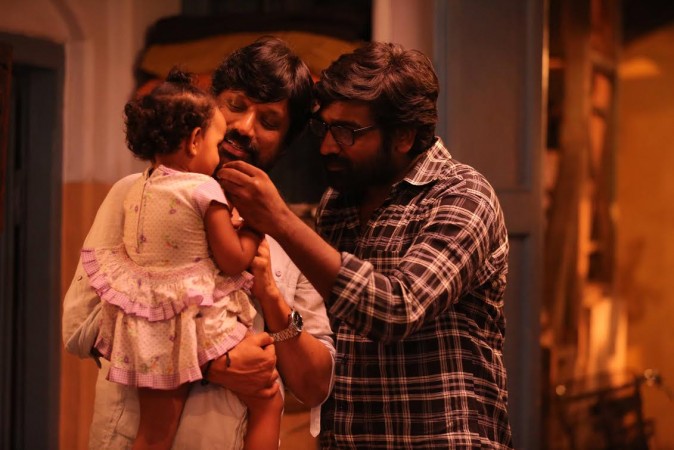
When Micheal realizes during the course of the burglary that he had been framed by Jagan, he feels betrayed. The fact that Jagan did it for the sake of Ponni further disillusions him. The sequence that follows when Michael confronts Ponni over this unexpected revelation is one of the boldest celluloid statements ever made in contemporary Tamil cinema. Ponni initially responds with the truth that Jagan had indeed proposed to her when he was in jail, and it had disturbed her. But she doesn’t stop there. She even accedes that she was tempted to say ‘Yes’ for a moment, but had eventually left without giving him an answer, probably unable to bring herself to break the marriage. Karthik aces this complex scene by completely humanizing his female lead. After all, why wouldn’t she aspire for true love and a better peaceful life? Why then didn’t she go ahead? What was that which emphatically influenced her to stick on to the capricious Michael? Love? Fear of social ridicule? Hope? Or was it the ideology that she had been perennially force-fed with – to make peace with destiny, come what may?
It’s not over yet. When Michael asks Ponni if she had slept with Jagan, she refuses to answer him. We get to know that she was well aware of Michael’s attempts to get back at Malar; but why then did she decide not to rake up the issue before? Did Michael really need to know the answer to live with her in peace? Was it the only thing that determined the strength of their marital bond? What if Ponni asked him the same question? The camera slowly pans to view the couple between the two arms of the cradle, as they decide to put the past behind. Again, more than passionate love, it was the child that was holding them together. Michael, for now, conciliates to the fact that some things are better left unsaid. Or so it seems!
The character of Jagan is easily the most intriguing of the lot. He is the feminist who constantly chides his father and brother for not giving their wives the life that they deserve. In college, he is the one who comes up with the toughest questions. Sample this. “If Kannagi had returned to Kovalan after a lustful extramarital affair, would he have accepted her for what she is?” But then, when it comes to his own love, his ideologies get grossly misplaced. He attempts to ignore Ponni after she gets married to Michael, but her sufferings keep tormenting him. He wants to see Ponni happy, and for that he goes to the extent of framing Michael for theft. Does he realize that Ponni wants to derive her happiness from Michael? Or does she?
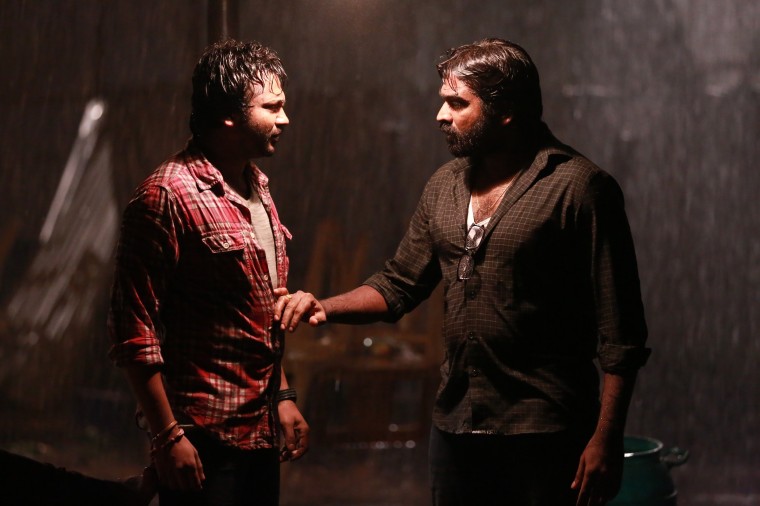
And thus, Karthik Subbaraj sets up his final act. All set to release his film, Arul goes to Yazhini’s home to set things right once for all, but finds Yazhini in the company of a prospective suitor. Seeing Arul at this moment probably affects Yazhini in a complex way. A gush of memories, both good and bad, come flooding nack. Rushing in to hug him, she pours her heart out pointing to the toughest decision she is being asked to take. Why is she again stranded on middle ground? “Neither can I forget nor can I pretend to ignore what you have always meant to me!” she cries. When Arul promises never to go back to his alcohol ways, Yazhini decides to call off the intended alliance. After all, wasn’t this the thing that she had always wanted?
And now the pandemonium begins. Michael wants some money from Arul to set up a new business, but he is no mood to get into an argument with Jagan. But when Jagan unexpectedly incites him by asking him to take good care of Ponni, he simply cuts loose, unable to take it anymore. He might not have foreseen the consequences, but what made him react in such a brutal way? Was it a visceral impulse or was it just years of pent up guilt bursting over? What stopped him from pausing and thinking for a moment? What made him forget his family for the second consecutive time? Was his subconscious self fuelling his need to remove Jagan from the equation, before he could make any peace with Ponni. But, wouldn’t any kind of happiness become elusive then? How contradictory! Again, is it something to do with testosterone?
Michael plans to leave the town immediately and boards a train with his family without divulging any details to Poorni. And to his own surprise now, his daughter calls him ‘Appa’. Does he deserve that status? Meanwhile, Arul, who had just met Yazhini’s suitor and explained the turn of events, learns about Jagan and lands up in the station. He walks up to Michael and stares at him. With most things settled and a promising future ahead of him, why does he do the hot-blooded thing that he does, when there is actually the opportunity to talk things out? What makes him put momentary gratification ahead of logical reasoning? A year of rehabilitation must have made him realize what it feels to be alone. Why then this act of stupidity? Was it because of an ingrained sense of being the stronger sex? If only had he exercised a fraction of the tolerance that his wife had exhibited for the sake of their family.
The horrified Ponni reluctantly walks back to the train. Once inside, she cries her heart out. The rain returns as the leitmotif. And slowly with the rains, a hint of clarity descends on her face. She asks her daughter if she wants to get wet. When the kid nods, she gets out on the ground and looks up to the shower. The small-town girl, who had never wantonly gotten drenched despite harbouring a desire for it – the one who wanted to seek happiness through her husband – had stepped out of the template, the world had stipulated for her. Simultaneously, Yazhini, who is going through mixed emotions, calls up her fiancé and explains the situation. She ushers in her daughter from the rains. Here, the girl who had wanted to break the template of her life had given her consent for the wedding. Does she find herself in a oxymoronic situation, where she wants to be independent, but time and again goes back to derive her autonomy from intimate bonds? If only deconstructing the human mind was that easy!
The screen fades out.
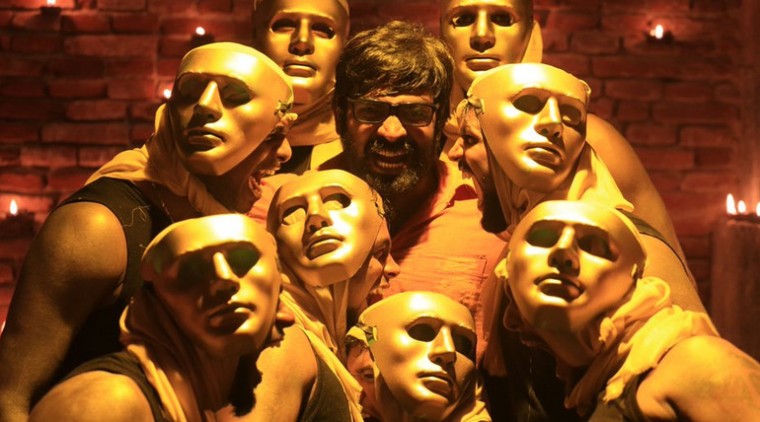
And so, before we consider Iraivi as a feminist statement (which sure it is, in a matter-of-fact way), we need to consider it as a compelling character study of the sexes – because that’s where Karthik Subbaraj hits the ball out of the park. Sure, there are things which could have made the film better, but we first need to address some of the criticisms put forward against the film. Why an alcoholic, a smuggler and a conniving lover for representing the sensibilities of a kind? From what I gather, these characters are what they are only because of the way they react to a conflict and the choices they make when pushed into a corner. It’s more about these conflicting traits that make or break them than what they get labelled as. Their impulsive decisions serve as broad but striking strokes in painting a bigger picture. Another much-debated issue is the manner in which the male characters are developed in far more detail than their female counterparts. I would have personally liked to see much more of Yazhini’s and Ponni’s internal conflicts in place of the intricately detailed smuggling episodes, but then, that would make Iraivi an entirely different film. Here, Karthik is content with narrating the tale of a few (wo)MEN, and he makes it a pretty fascinating one at that.

great article 🙂 enjoyed reading completely 🙂
LikeLike